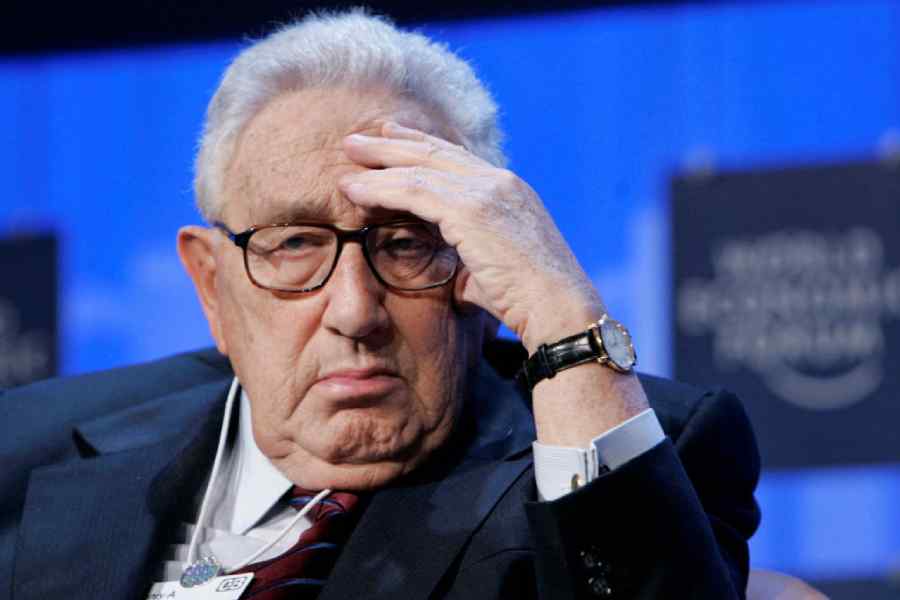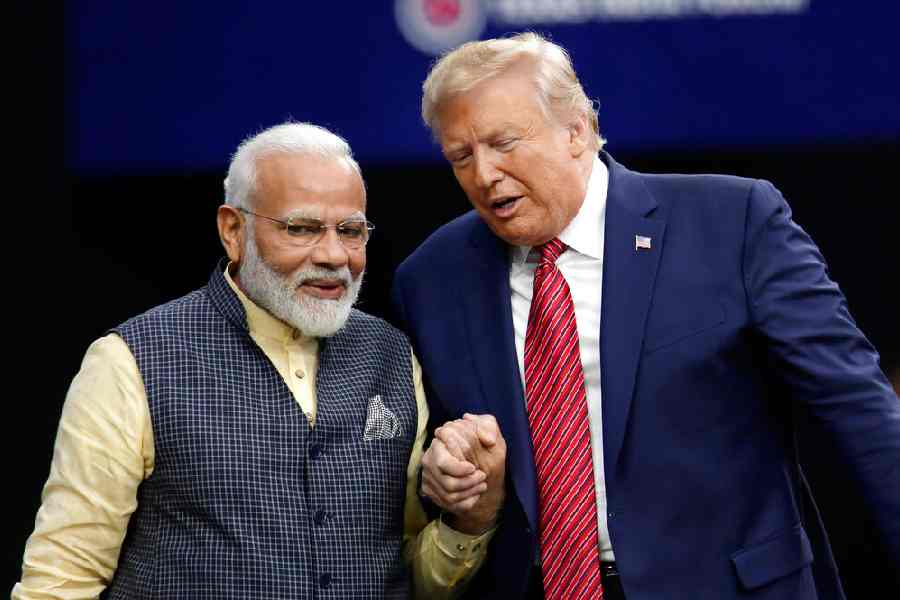As the year draws to a close with only darkness engulfing the tunnel of Gaza’s agony, one recalls that even Henry Kissinger stressed at a top-secret breakfast meeting with Jewish bigwigs that “Israel should indicate what territory it was willing to give up.” That was during the first anti-Israel Intifada (1987-1993) when, warning his co-religionists that “there are no awards for losing with moderation”, Kissinger also urged Israel to suppress “the insurrection as quickly as possible — overwhelmingly, brutally and rapidly.”
The “first step should be to throw out television”, ban media coverage and ignore the inevitable international uproar, he told the Conference of Presidents of Major American Jewish Organizations. Apartheid South Africa had done it. Why not Israel? Or India, for that matter, now that New Delhi spurns the attractive innocence of the high moral ground of non-alignment? In fact, Kissinger would have gloated over this newspaper’s front-page second lead, “India sides with West”, the day after Hamas’s brutal attack on Israelis. Not because his West needed servile henchmen; but because by rallying to the winning side, India had publicly espoused “the practices of Realpolitik”.
One assumes that he was not incapacitated on October 7 and also that Kissinger Associates advisors deemed Narendra Modi’s brave proclamation, “We stand in solidarity with Israel at this difficult hour”, important enough to bring to his ears. Some doubt is permissible because one didn’t notice much excitement in the international media over Hindu Bharat’s championship of the Zionist State. Given the jihadist commitment of the Hamas fighters, Modi’s support for Benjamin Netanyahu may have been taken for granted. The silence may also have been another reminder that India is ‘vishwaguru’ only to deluded ultra-loyalists. The world knows India as the most densely-populated nation that must get rid of as many citizens as it can, sending them to eke out a living in far-flung corners of the globe, because its ramshackle economy cannot offer them a decent livelihood.
Yet, India does set an example for a vengeful Israel targeting civilians (although Washington insists that this cannot be proved) in hospitals, camps and other places of shelter. Kissinger himself would have produced a frenzied I-told-you-so response if Indira Gandhi had treated East Pakistan like an Indian colony in December 1971. Instead, she told the Lok Sabha that “Dhaka is the free capital of free Bangladesh.” Netanyahu has much to learn from that unparalleled instance of enlightened self-interest. Israel seized East Jerusalem from Jordan in 1948 and still clings to it. Syria’s Golan Heights were annexed during the 1967 war; the West Bank and Gaza Strip, variously called the armpit of Palestine and the world’s biggest open-air prison, were conquered at the same time and are like apartheid South Africa’s Bantustans. Only the Sinai Peninsula, taken during the 1956 Anglo-French-Israeli invasion of Egypt, was returned in 1982.
Asian self-esteem and global stability demand that all fruits of conquest be relinquished, obviously under credible international auspices so that Israel too continues to prosper within secure borders. But the end of Israeli occupation of Palestinian territory can be meaningful only as the last phase of an agreed timeline. The first need is a ceasefire leading to a permanent settlement instead of only brief, intermittent pauses in hostilities. The second is the reconstruction of the war’s devastation, followed by the withdrawal of more than 450,000 Israeli settlers trespassing into the West Bank — which Israelis possessively call Judea and Samaria — and another 220,000 or more in East Jerusalem. Adding insult to injury, these intruders reportedly combine the most offensive aspects of white colonial bullies and terrorists.
Many in the government from which they draw their strength were weaned on the song by the American Jewish playwright, Ben Hecht, “Every time a British soldier dies, there’s a song in my heart”. Denying any debt to the Balfour Declaration’s homeland promise or migration under the British Mandate, Israeli veterans boast they achieved independence by fighting for it. Their heroes — David Ben-Gurion, Menachem Begin, Yigal Allon, Moshe Dayan, Yitzhak Shamir and other Zionist fighters in Irgun, the Stern Gang, or the Sayeret Matkal special forces to which Netanyahu belonged — bombed Jerusalem’s King David Hotel and massacred all the Palestinians in Deir Yassin village among many other atrocities. One man’s terrorist is another’s freedom fighter.
Whether official, collective or individual, terrorism is not the prerogative of any one community. Israel’s invasion of Lebanon helped to create Hezbollah, the Shiite member of what Iran calls the “axis of resistance”. As for Hamas, the villain of the piece, the evidence points to calculated Israeli patronage of a rival to Yasser Arafat’s Fatah and the Palestine Liberation Organization. At the same time, the “struggle” against “occupation”, as Ronald Reagan told the Afghans in 1982, “represents man’s highest aspirations for freedom.”
“Samson, in his time, took a drastic step, bringing down the columns of the shrines in Gaza,” wrote Shimon Peres, Israel’s eighth prime minister, ninth president and far more the mukhota for hard-line practices than Atal Bihari Vajpayee ever was. “There was no point in our repeating it.” There is for Netanyahu whose determination to exterminate Hamas seems even more compelling than rescuing Jewish hostages. He can’t be unaware of the dragon’s teeth of Greek mythology which, when sown, sprouted armed warriors, but must be confident like Jason, the antique hero in search of the Golden Fleece, of being able to kill them all.
In consequence, hapless Gazans are constantly urged to move on. But where to? No building, no fragment of land is safe from Israel’s carpet-bombing. An Israeli joke mocks Palestinians for allegedly believing that a map of the Jewish State stretching “from the Brook of Egypt to the Euphrates” adorns the Knesset walls. Perhaps such a map does exist in Zionist hearts and minds. Perhaps the murderous campaign against Gaza is intended to achieve that dream by thinning out the population and weakening the human challenge of the future just as Palestinian lands are being whittled away so that the territorial challenge is minimal. Israel’s insistence on a buffer zone is another ploy to further deprive Palestinians of their foothold.
Kissinger’s much-reviled boss, Richard Nixon, seemed to take a more balanced view of international affairs, perhaps derived from his Quaker grandmother who gave him a book on Mahatma Gandhi when he was only seventeen and which he claimed to have read over and over again. Nixon argued as long ago as 1988 that a victorious Israel’s first task should be a voluntary settlement with its neighbours “rather than waiting until their growing strength forces Israel to do so.” Murmurs in the Beltway against continuing massive military aid to Israel makes the advice especially pertinent, drawing attention to Nixon’s warning, “Despite our friendship, Israel cannot survive forever as an island in a sea of hatred.”
I doubt if Kissinger with his lofty notion of statecraft would have placed that limitation on American might. Daniel Patrick Moynihan, the ambassador with a monumental ego, writes that although protocol dictated that he should step out of Air Force One “behind the President and ahead of Kissinger… somehow Kissinger invariably reached the ground” first. The maestro of sleight of hand also got his comeuppance. When we last met at a formal dinner in Singapore in the 1990s, Kissinger understandably had no recollection of me as one of his Harvard seminarians. But he was warm and friendly, as he was to anyone who had spent a summer under his tutelage and could be called his ‘student’. With the keen eye for public projection that Moynihan noted, he placed an arm around my shoulder and turned to where the photographers had been massed. But it was late and they had gone.
He is gone too now but his advice on returning Palestinian land remains more valid than ever if the new year is not to start in the darkness of the old.











